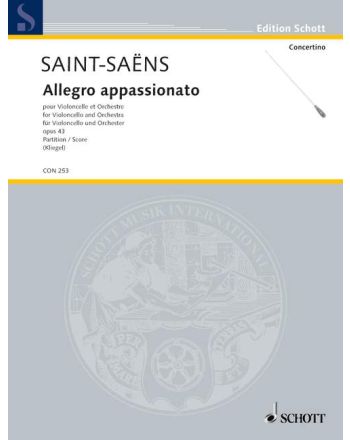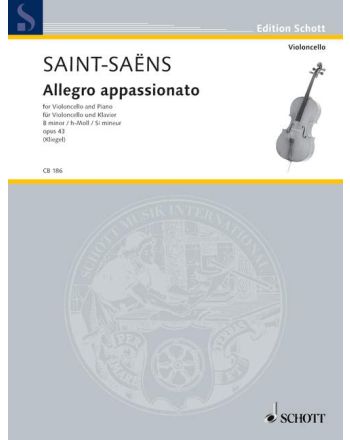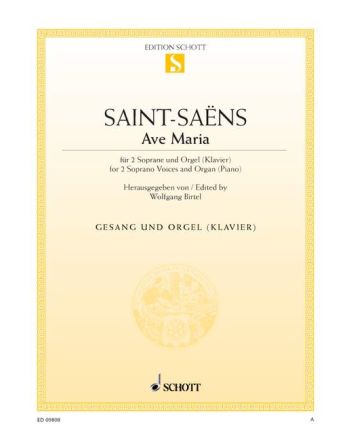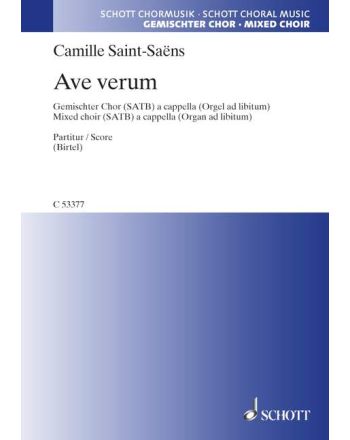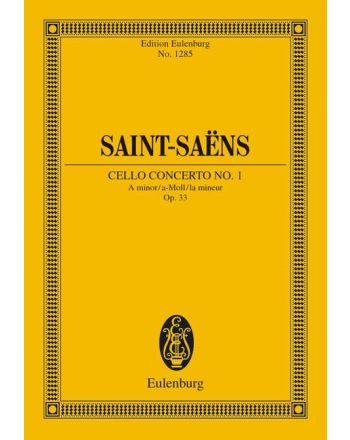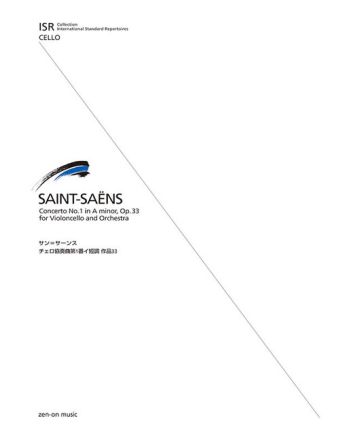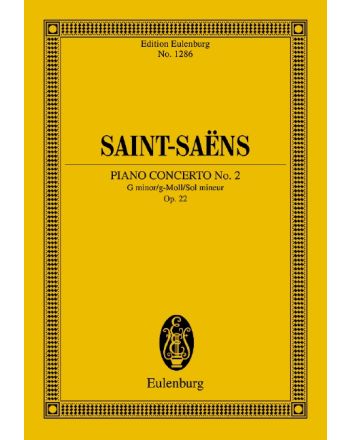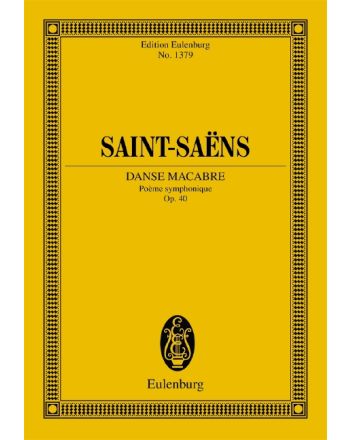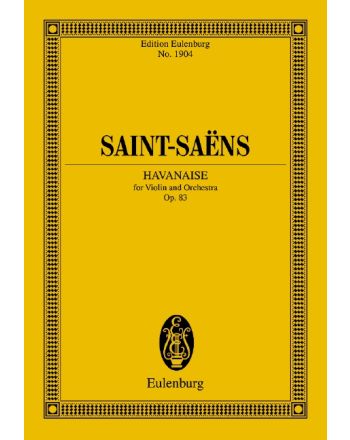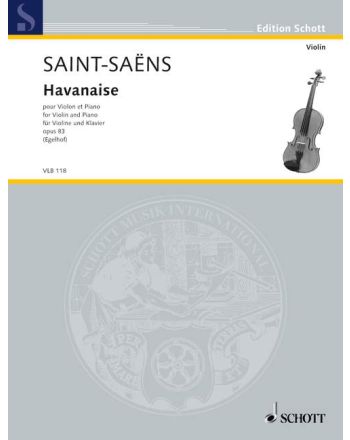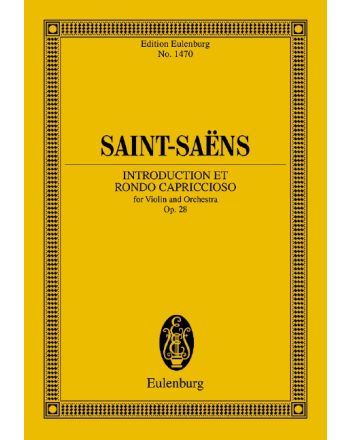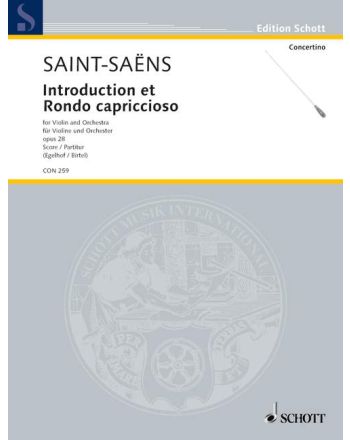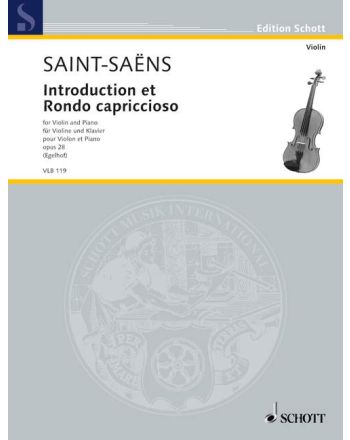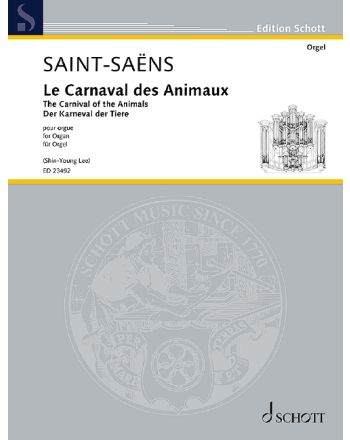
Camille Saint-Saëns
Pays d'origine:
France
Date d'anniversaire:
9 octobre 1835
Date de décès:
16 décembre 1921
À propos de Camille Saint-Saëns
Camille Saint-Saëns, French composer, gave demanding piano concerts at the age of ten and from 1848 studied organ with François Benoist (*1794, 1878) and composition with Fromental Halévy at the Paris Conservatoire. He worked as an organist at the churches of Saint-Merry (since 1853) and Madeleine (since 1857) and achieved great renown as an interpreter and improviser on the organ. From 1861 to 1865 he taught at the École Niedermeyer where Gabriel Fauré was one of his pupils. In 1871 he founded the Societé Nationale de Musique with Romain Bussine (*1830, 1899) to foster primarily young French composers.'
Saint-Saëns' music has great variety and variability while being essentially orientated towards Viennese Classicism and German Romanticism. In France, Saint-Saëns conveyed a deep understanding of the works by Bach, Handel and Mozart, but also of those by Schumann and Wagner. His symphonic poems are proof of the decisive influence of Liszt and the examination of new means of expression and genre tendencies. In the 1870s and 1880s, Saint-Saëns created compositions, not only in the field of the opera (which mainly influenced the musical life in Paris), but also in the fields of symphonic, concert and chamber music, which had a determining influence on the development of French music in the late 19th century.
Saint-Saëns wrote 13 operas, including »Samson et Dalila« (1877), »Étienne Marcel« (1879), »Henri VIII« (1883), »Ascanio« (1890); five symphonies (Symphony No. 3 in C minor, 1886; with organ); four symphonic poems (e.g. »La danse macabre«, 1875); violin, violoncello and piano concertos, chamber music, organ and piano music (e.g. »Le carnaval des animaux« [The Carnival of the Animals], and from it »The Swan« 1886); »Messe solennelle« (1856), the oratorio »Le déluge« (1875) and a requiem (1878).
Saint-Saëns' music has great variety and variability while being essentially orientated towards Viennese Classicism and German Romanticism. In France, Saint-Saëns conveyed a deep understanding of the works by Bach, Handel and Mozart, but also of those by Schumann and Wagner. His symphonic poems are proof of the decisive influence of Liszt and the examination of new means of expression and genre tendencies. In the 1870s and 1880s, Saint-Saëns created compositions, not only in the field of the opera (which mainly influenced the musical life in Paris), but also in the fields of symphonic, concert and chamber music, which had a determining influence on the development of French music in the late 19th century.
Saint-Saëns wrote 13 operas, including »Samson et Dalila« (1877), »Étienne Marcel« (1879), »Henri VIII« (1883), »Ascanio« (1890); five symphonies (Symphony No. 3 in C minor, 1886; with organ); four symphonic poems (e.g. »La danse macabre«, 1875); violin, violoncello and piano concertos, chamber music, organ and piano music (e.g. »Le carnaval des animaux« [The Carnival of the Animals], and from it »The Swan« 1886); »Messe solennelle« (1856), the oratorio »Le déluge« (1875) and a requiem (1878).
Produits
-
Compositeur: Camille Saint-SaënsEditeur: Klaus BörnerMedia Type: Partition électronique en PDFInstrumentation: piano à 4 mainsNuméro du produit: ED 9051 Q12128Partition PDFPartition PDFEn stock2,99 €TTC
-
Compositeur: Camille Saint-SaënsEditeur: Maria KliegelEdition: PartitionSéries: Concertino
Edition Schott
Instrumentation: violoncelle et orchestreNuméro du produit: CON 253Type de produitEn stockPrix à partir de 15,99 €TTC -
Si mineurCompositeur: Camille Saint-SaënsEditeur: Maria KliegelSéries: Cello Library
Edition Schott
Instrumentation: violoncelle et pianoNuméro du produit: CB 186Type de produitEn stockPrix à partir de 10,99 €TTC -
Compositeur: Camille Saint-SaënsMedia Type: Partition électronique en PDFInstrumentation: violoncelle et pianoNuméro du produit: ED 22354 Q45611Partition PDFPartition PDFEn stock3,99 €TTC
-
Compositeur: Camille Saint-SaënsEditeur: Maria KliegelMedia Type: Partition électronique en PDFInstrumentation: violoncelle et pianoNuméro du produit: ED 20916 Q18161Partition PDFPartition PDFEn stock3,99 €TTC
-
Compositeur: Camille Saint-SaënsEditeur: Wolfgang Birtel | Maria KliegelMedia Type: PartitionEdition: Jeu de parties, Flöte I, Flöte II, Oboe I, Oboe II, Klarinette I, Klarinette II, Fagott I, Fagott II, Horn I, Horn II, 4 Violine I, 4 Violine II, 2 Viola, 4 Violoncello/KontrabassSéries: Concertino
Edition Schott
Instrumentation: violoncelle et orchestreNuméro du produit: CON 253-50Format papierFormat papierEn stock58,00 €TTC, hors expédition -
Compositeur: Camille Saint-SaënsEditeur: Wolfgang BirtelInstrumentation: 2 sopranos (soprano/alto) et orgueNuméro du produit: ED0 9808Type de produitEn stockPrix à partir de 3,99 €TTC
-
Compositeur: Camille Saint-SaënsEditeur: Wolfgang BirtelEdition: Partition de choeur, Orgelbegleitung unterlegtSérie: Schott Choral Music
Instrumentation: choeur mixte (SATB) et orgue (ad lib.)Numéro du produit: C 53377Type de produitEn stockPrix à partir de 2,99 €TTC -
Compositeur: Camille Saint-SaënsEditeur: Wolfgang BirtelInstrumentation: 2 sopranos (soprano/alto) et orgueNuméro du produit: ED0 9807Type de produitEn stockPrix à partir de 3,99 €TTC
-
Compositeur: Camille Saint-SaënsMedia Type: PartitionEdition: Partition de pocheInstrumentation: orchestreNuméro du produit: ZO 891955Format papierFormat papierÉpuisé15,50 €TTC, hors expédition
-
Compositeur: Camille Saint-SaënsEditeur: Klaus BörnerMedia Type: Partition électronique en PDFInstrumentation: piano à 4 mainsNuméro du produit: ED 9051 Q12129Partition PDFPartition PDFEn stock2,99 €TTC
-
Compositeur: Camille Saint-SaënsMedia Type: Partition électronique en PDFInstrumentation: violon et pianoNuméro du produit: ED 22404 Q46277Partition PDFPartition PDFEn stock3,99 €TTC
-
Compositeur: Camille Saint-SaënsArrangeur: Johannes X. SchachtnerMedia Type: PartitionInstrumentation: piano à 6 mainsNuméro du produit: SIK1768Format papierFormat papierEn stock27,50 €TTC, hors expédition
-
Compositeur: Camille Saint-SaënsArrangeur: Frank J. HalfertyMedia Type: PartitionEdition: Partition et parties, Concert String OrchestraInstrumentation: orchestre à cordesLangue: AnglaisNuméro du produit: KN 9987Format papierFormat papierÉpuisé81,50 €TTC, hors expédition
-
Compositeur: Camille Saint-Saëns | Franz Schubert | Ethan WinerMedia Type: Partition avec CDEdition: Edition avec play-alongInstrumentation: violoncelleNuméro du produit: MMO 3716Format papier + CDFormat papier + CDÉpuisé18,99 €TTC, hors expédition
-
Compositeur: Camille Saint-SaënsEdition: Partition d'étudeInstrumentation: violoncelle et orchestreNuméro du produit: ETP 1285Type de produitEn stockPrix à partir de 10,99 €TTC
-
Compositeur: Camille Saint-SaënsMedia Type: PartitionEdition: Réduction pour piano avec partie solisteInstrumentation: violoncelle et orchestreLangue: Japonais, AnglaisNuméro du produit: ZO 336124Format papierFormat papierÉpuisé27,50 €TTC, hors expédition
-
Compositeur: Camille Saint-SaënsEditeur: Alexander MaschatMedia Type: PartitionEdition: PartitionInstrumentation: violoncelle et orchestreNuméro du produit: ACC1850Format papierFormat papierEn stock32,00 €TTC, hors expédition
-
Compositeur: Camille Saint-SaënsEditeur: Alexander MaschatMedia Type: PartitionEdition: Jeu de partiesInstrumentation: violoncelle et orchestreNuméro du produit: ACC1850OFormat papierFormat papierEn stock80,00 €TTC, hors expédition
-
Compositeur: Camille Saint-SaënsMedia Type: Partition avec CDEdition: Edition avec play-alongInstrumentation: pianoNuméro du produit: MMO 6036Format papier + CDFormat papier + CDEn stock28,99 €TTC, hors expédition
-
Compositeur: Camille Saint-SaënsEdition: Partition d'étudeInstrumentation: piano et orchestreNuméro du produit: ETP 1286Type de produitEn stockPrix à partir de 12,99 €TTC
-
Compositeur: Camille Saint-SaënsMedia Type: PartitionEdition: Réduction pour piano avec partie solisteInstrumentation: violon et orchestreNuméro du produit: ZO 8002079Format papierFormat papierÉpuisé30,50 €TTC, hors expédition
-
Compositeur: Camille Saint-SaënsMedia Type: Partition avec Matériel en ligneInstrumentation: violoncelleLangue: AnglaisNuméro du produit: MMO 3779Format papier + Matériel en ligneFormat papier + Matériel en ligneÉpuisé24,99 €TTC, hors expédition
-
Compositeur: Camille Saint-SaënsEditeur: Hans-Hubert SchönzelerMedia Type: Partition avec CDEdition: Partition d'étudeSérie: Eulenburg Audio+Score
Instrumentation: violoncelle et orchestreLangue: Allemand, AnglaisNuméro du produit: EAS 168Format papier + CDFormat papier + CDEn stock16,00 €TTC, hors expédition -
Media Type: PartitionEdition: PartitionInstrumentation: StreichorchesterNuméro du produit: 3035082Format papierFormat papierÉpuisé18,95 €TTC, hors expédition
-
Media Type: PartitionEdition: Partition et partiesInstrumentation: StreichorchesterNuméro du produit: 3035081Format papierFormat papierÉpuisé87,50 €TTC, hors expédition
-
Poème symphoniqueCompositeur: Camille Saint-SaënsEdition: Partition d'étudeInstrumentation: orchestreNuméro du produit: ETP 1379Type de produitEn stockPrix à partir de 9,99 €TTC
-
arrangiert für Kammerensemble von Michael Rot (2016)Compositeur: Camille Saint-SaënsArrangeur: Michael RotMedia Type: Partition électronique en PDFEdition: Partition et partiesInstrumentation: violon, alto, violoncelle et pianoNuméro du produit: DVGH 2042-71 Q52857Partition PDFPartition PDFEn stock19,99 €TTC
-
Media Type: Partition électronique en PDFInstrumentation: flûte et pianoLangue: AnglaisNuméro du produit: ED 13870 Q45123Partition PDFPartition PDFEn stock2,99 €TTC
-
Media Type: Partition électronique en PDFInstrumentation: violoncelle et pianoLangue: AnglaisNuméro du produit: ED 13862 Q45073Partition PDFPartition PDFEn stock2,99 €TTC
-
Media Type: Partition électronique en PDFInstrumentation: violon et pianoLangue: AnglaisNuméro du produit: ED 13861 Q45022Partition PDFPartition PDFEn stock2,99 €TTC
-
Compositeur: Camille Saint-SaënsAuteur: Barrie Carson TurnerMedia Type: Partition électronique en PDFInstrumentation: pianoLangue: AnglaisNuméro du produit: ED 13860 Q44928Partition PDFPartition PDFEn stock2,99 €TTC
-
from Symphonic Poem in G minor, op. 40Compositeur: Camille Saint-SaënsArrangeur: Herman A. Hummel | Harvey S. WhistlerMedia Type: PartitionEdition: Partition et partiesInstrumentation: ensemble d'instruments à cordesLangue: AnglaisNuméro du produit: HLA 4490656Format papierFormat papierÉpuisé49,99 €TTC, hors expédition
-
aus "Karneval der Tiere"Compositeur: Camille Saint-SaënsArrangeur: Hans-Günter HeumannMedia Type: Partition électronique en PDFInstrumentation: pianoNuméro du produit: ED 21333 Q13029Partition PDFPartition PDFEn stock2,99 €TTC
-
La Volière/Le CygneCompositeur: Camille Saint-SaënsArrangeur: Werner RichterMedia Type: PartitionInstrumentation: flûte et pianoLangue: Allemand, Français, AnglaisNuméro du produit: ZM30750Format papierFormat papierEn stock11,00 €TTC, hors expédition
-
Gran fantasía zoológicaCompositeur: Camille Saint-SaënsArrangeur: Hans-Günter HeumannInstrumentation: pianoNuméro du produit: ED 20582Type de produitEn stockPrix à partir de 10,99 €TTC
-
Compositeur: Camille Saint-SaënsEditeur: Wolfgang BirtelEdition: Partition d'étudeInstrumentation: violon et orchestreNuméro du produit: ETP 1904Type de produitEn stockPrix à partir de 8,99 €TTC
-
Compositeur: Camille Saint-SaënsEditeur: Maria EgelhofSéries: Edition Schott
Violin Library
Instrumentation: violon et pianoNuméro du produit: VLB 118Type de produitEn stockPrix à partir de 9,99 €TTC -
Compositeur: Camille Saint-SaënsEditeur: Wolfgang Birtel | Maria EgelhofEdition: Partition d'étudeInstrumentation: violon et orchestreNuméro du produit: ETP 1470Type de produitEn stockPrix à partir de 8,99 €TTC
-
Compositeur: Camille Saint-SaënsEditeur: Wolfgang Birtel | Maria EgelhofEdition: PartitionSéries: Concertino
Edition Schott
Instrumentation: violon et orchestreNuméro du produit: CON 259Type de produitEn stockPrix à partir de 18,99 €TTC -
Compositeur: Camille Saint-SaënsEditeur: Maria EgelhofSéries: Edition Schott
Violin Library
Instrumentation: violon et pianoNuméro du produit: VLB 119Type de produitEn stockPrix à partir de 12,99 €TTC -
Compositeur: Camille Saint-SaënsEditeur: Wolfgang Birtel | Maria EgelhofMedia Type: PartitionEdition: Jeu de parties, Flöte I, Flöte II, Oboe I, Oboe II, Klarinette I, Klarinette II, Fagott I, Fagott II, Horn I, Horn II, Trompete I, Trompete II, Pauke, 4 Violine I, 4 Violine II, 2 Viola, 2 Violoncello, 2 KontrabassSéries: Concertino
Edition Schott
Instrumentation: violon et orchestreNuméro du produit: CON 259-50Format papierFormat papierEn stock68,00 €TTC, hors expédition -
Compositeur: Camille Saint-SaënsEditeur: Wolfgang BirtelMedia Type: Partition avec CDEdition: Partition d'étudeSérie: Eulenburg Audio+Score
Instrumentation: violon et orchestreLangue: Allemand, AnglaisNuméro du produit: EAS 191Format papier + CDFormat papier + CDEn stock16,00 €TTC, hors expédition -
de: Carnaval des animauxArrangeur: Hans-Günter HeumannCompositeur: Camille Saint-SaënsMedia Type: Partition électronique en PDFInstrumentation: pianoNuméro du produit: ED 23853 Q779484Partition PDFPartition PDFEn stock1,99 €TTC
-
de: Le Carnaval des animauxCompositeur: Camille Saint-SaënsMedia Type: Partition électronique en PDFInstrumentation: contrebasse et pianoNuméro du produit: ED 22412 Q558862Partition PDFPartition PDFEn stock3,99 €TTC
-
Compositeur: Camille Saint-SaënsArrangeur: Shin-Young LeeSérie: Edition Schott
Instrumentation: orgueNuméro du produit: ED 23492Type de produitEn stockPrix à partir de 11,99 €TTC -
Compositeur: Camille Saint-SaënsArrangeur: Christoph EnzelMedia Type: PartitionEdition: Partition et partiesInstrumentation: 4 saxophones (SATBar)Numéro du produit: ADV 7667Format papierFormat papierEn stock34,95 €TTC, hors expédition
-
Grande fantaisie zoologiqueCompositeur: Camille Saint-SaënsEditeur: Felix AprahamianMedia Type: Partition avec CDEdition: Partition d'étudeSérie: Eulenburg Audio+Score
Instrumentation: OrchestreLangue: Allemand, AnglaisNuméro du produit: EAS 199Format papier + CDFormat papier + CDEn stock15,00 €TTC, hors expédition -
Compositeur: Camille Saint-SaënsMedia Type: PartitionEdition: Partition de pocheInstrumentation: orchestreNuméro du produit: ZO 8000638Format papierFormat papierEn stock10,95 €TTC, hors expédition
-
Compositeur: Camille Saint-SaënsArrangeur: Yoshiki MiyamotoMedia Type: PartitionEdition: Partition d'exécutionSérie: Piano Picture Book
Instrumentation: piano à 4 mainsNuméro du produit: ZO 200168Format papierFormat papierEn stock34,95 €TTC, hors expédition


